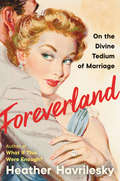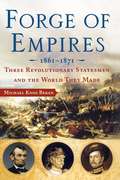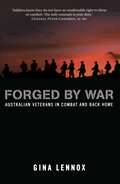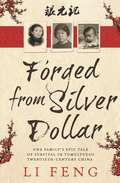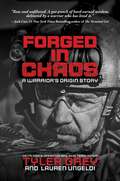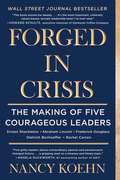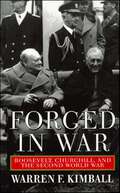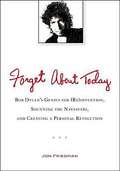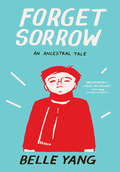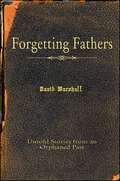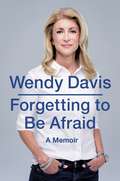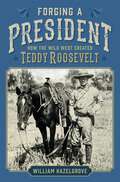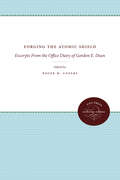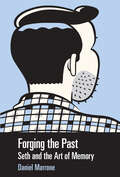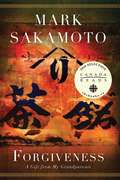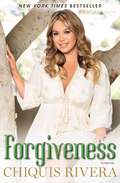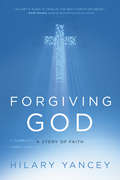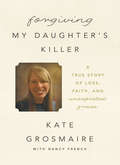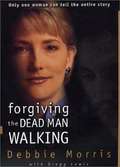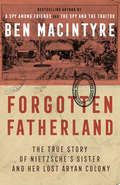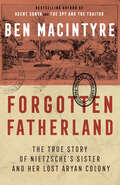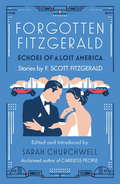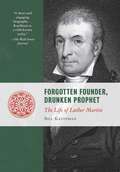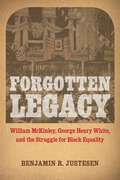- Table View
- List View
Foreverland: On the Divine Tedium of Marriage
by Heather HavrileskyAn illuminating, poignant, and savagely funny examination of modern marriage from Ask Polly advice columnist Heather Havrilesky. <p><p> If falling in love is the peak of human experience, then marriage is the slow descent down that mountain, on a trail built from conflict, compromise, and nagging doubts. Considering the limited economic advantages to marriage, the deluge of other mate options a swipe away, and the fact that almost half of all marriages in the United States end in divorce anyway, why do so many of us still chain ourselves to one human being for life? <p><p> In Foreverland, Heather Havrilesky illustrates the delights, aggravations, and sublime calamities of her marriage over the span of fifteen years, charting an unpredictable course from meeting her one true love to slowly learning just how much energy is required to keep that love aflame. This refreshingly honest portrait of a marriage reveals that our relationships are not simply “happy” or “unhappy,” but something much murkier—at once unsavory, taxing, and deeply satisfying. <p><p> With tales of fumbled proposals, harrowing suburban migrations, external temptations, and the bewildering insults of growing older, Foreverland is a work of rare candor and insight. Havrilesky traces a path from daydreaming about forever for the first time to understanding what a tedious, glorious drag forever can be.
Forge of Empires: Three Revolutionary Statesmen and the World They Made, 1861-1871
by Michael Knox BeranIn the space of a single decade, three leaders liberated tens of millions of souls, remade their own vast countries, and altered forever the forms of national power: Abraham Lincoln freed a subjugated race and transformed the American Republic. Tsar Alexander II broke the chains of the serfs and brought the rule of law to Russia. Otto von Bismarck threw over the petty Teutonic princes, defeated the House of Austria and the last of the imperial Napoleons, and united the German nation. The three statesmen forged the empires that would dominate the twentieth century through two world wars, the Cold War, and beyond. Each of the three was a revolutionary, yet each consolidated a nation that differed profoundly from the others in its conceptions of liberty, power, and human destiny. Michael Knox Beran's Forge of Empires brilliantly entwines the stories of the three epochal transformations and their fateful legacies. Telling the stories from the point of view of those who participated in the momentous events -- among them Walt Whitman and Friedrich Nietzsche, Mary Chesnut and Leo Tolstoy, Napoleon III and the Empress EugÉnie -- Beran weaves a rich tapestry of high drama and human pathos. Great events often turned on the decisions of a few lone souls, and each of the three statesmen faced moments of painful doubt or denial as well as significant decisions that would redefine their nations. With its vivid narrative and memorable portraiture, Forge of Empires sheds new light on a question of perennial importance: How are free states made, and how are they unmade? In the same decade that saw freedom's victories, one of the trinity of liberators revealed himself as an enemy to the free state, and another lost heart. What Lincoln called the "germ" of freedom, which was "to grow and expand into the universal liberty of mankind," came close to being annihilated in a world crisis that pitted the free state against new philosophies of terror and coercion. Forge of Empires is a masterly story of one of history's most significant decades.
Forged By War: Australian Veterans in Combat and Back Home
by Gina LennoxIn Forged By War, Australian veterans and their families reveal the experience of combat and how it has changed their lives. These stark first-hand accounts describe the reality of military action and its personal consequences in every major conflict and peacemaking mission since World War II, including the invasion of Iraq. Sometimes the reader is in lockstep with a soldier on patrol, watching as a land mine explodes, or a local militiaman points an AK–47 at Australian peacemakers. Other times, the reader is inside a returned veteran's head, feeling their superfluous adrenalin, their need to control their environment, even at home. With accounts from Peter and Lynne Cosgrove, Graham Edwards, Frank Hunt (I Was Only Nineteen), other veterans of Vietnam, Glenda Humes (daughter of Capt Reginald Saunders), peacemakers and an SAS trooper, this compelling investigation by Gina Lennox in underpinned by the question: where does family fit in a soldier's life?
Forged From Silver Dollar
by Li FengOne family's epic tale of survival in tumultuous twentieth-century China.Li Feng grew up in Mao's communist China with her mother's motto burning in her ears - Success demands two things: unconditional sacrifice and absolute mental focus. Finally breaking free of her mother's overbearing clutches and fleeing to Sydney as an adult, Li struggled to make sense of her own lost childhood by piecing together her family's history.What she found was a heartbreaking tale of love and loss that echoed across four generations of women - from Silver Dollar, who fought to regain her dignity and change her destiny after being sold into a loveless marriage at the age of 13; to Ming Xiu, who was forced to make a choice no mother should ever have to make following the execution of her husband; to Li's mother Rong, who grew up as an outcast on the periphery of society but never gave up hope of a better life for herself and for her daughters.Despite economic and political upheaval, these women battled to offer their children a better future through sheer determination in the face of unimaginable adversity. FORGED FROM SILVER DOLLAR is an inspiring true story about Modern China, iron will and the strength of a mother's love.
Forged in Chaos: A Warrior's Origin Story
by Tyler Grey Lauren UngeldiForged in chaos, shattered in peace: What happens when the war doesn&’t end, it just moves inside your head?Tyler Grey was the epitome of the warrior archetype: a Delta Force operator, a master of counterterrorism. He hunted the worst bullies on the world&’s playground—high-value targets, bomb makers, warlords—executing covert missions that never made the news. He had perfected the persona—ruthless, efficient, untouchable—until one mission in Sadr City, Iraq changed everything.&” On what should&’ve been a routine raid, an explosion ripped through the home shattering more than just flesh and bone; it fractured his identity. Stripped of everything that defined him, Tyler reached for chaos: sex, substances, a romance that was either a love worth fighting for or his ultimate kryptonite. But beneath it all, the hunger for chaos never died. He was built for it. Without it, his body rebelled, his mind fractured, and the war turned inward. In this raw, antiheroic tale, Tyler dissects his life, exposing the unseen war within and exploring the question: What happens when the very abilities that made you a superhero in the eyes of the world turn you into a supervillain in your own life? Despite rising PTSD awareness, we&’re losing more warriors at home than in war. Such a devastating reality begs the question: What if we&’ve fundamentally misunderstood this disease? This book doesn&’t challenge the narrative; it destroys it, laying bare the cost of being forged in chaos. This isn&’t a war story. It isn&’t a tribute to sacrifice or a highlight reel of heroics. Forged in Chaos rips the mask off the warrior experience, exposing the truth that most never dare to face: The fight isn&’t over. And this time, the enemy isn&’t out there—it&’s within.
Forged in Crisis: The Making of Five Courageous Leaders
by Nancy KoehnAn enthralling historical narrative filled with critical leadership insights that will be of interest to a wide range of readers—including those in government, business, education, and the arts—Forged in Crisis, by celebrated Harvard Business School historian Nancy Koehn, spotlights five masters of crisis: polar explorer Ernest Shackleton; President Abraham Lincoln; legendary abolitionist Frederick Douglass; Nazi-resisting clergyman Dietrich Bonhoeffer; and environmental crusader Rachel Carson.What do such disparate figures have in common? Why do their extraordinary stories continue to amaze and inspire? In delivering the answers to those questions, Nancy Koehn offers a remarkable template by which to judge those in our own time to whom the public has given its trust. She begins each of the book’s five sections by showing her protagonist on the precipice of a great crisis: Shackleton marooned on an Antarctic ice floe; Lincoln on the verge of seeing the Union collapse; escaped slave Douglass facing possible capture; Bonhoeffer agonizing over how to counter absolute evil with faith; Carson racing against the cancer ravaging her in a bid to save the planet. The narrative then reaches back to each person’s childhood and shows the individual growing—step by step—into the person he or she will ultimately become. Significantly, as we follow each leader’s against-all-odds journey, we begin to glean an essential truth: leaders are not born but made. In a book dense with epiphanies, the most galvanizing one may be that the power to lead courageously resides in each of us. Both a repository of great insight and an exceptionally rendered human drama, Forged in Crisis stands as a towering achievement.
Forged in War: Roosevelt, Churchill, and the Second World War
by Warren F. KimballWorld War II created the union between Franklin Roosevelt and Winston Churchill, molding it from start to finish, while the partnership itself shaped many of the most significant moments of the war and the peace that followed. Their connection was truly forged in war. Roosevelt and Churchill continue to fascinate both the World War II generation and those who have grown up in the world formed by that struggle. Here is an inside look at their relationship and the politics, strategy, and diplomacy of the British-American alliance. Warren F. Kimball's lively analysis of these larger-than-life figures shows how they were at the same time realists and idealists, consistent and inconsistent, calculating and impulsive. The result is an unforgettable narrative.
Forget About Today
by Jon FriedmanForget About Today shows a side of Bob Dylan that most people—from fans to skeptics—have never seen. Rather than another gossipy account of his romances, finances, or family, journalist Jon Friedman offers a new perspective on Dylan’s revolutionary and enduring legacy through an intimate look at the mystery behind Dylan’s success. Bob Dylan has been a pop culture mainstay for more than 50 years as a poet, songwriter, and performer. Yet from his decision to go electric while everyone clung to his folk roots to his shocking appearance on a Victoria’s Secret commercial, critics have predicted Dylan’s demise every step of the way. Each time, he’s proven legions of doubters wrong, never letting anyone keep him from accomplishing goals—on his terms. Featuring exclusive insights from Dylan’s most trusted confidants, Forget About Today provides a unique look at Dylan’s life and career while it distills valuable advice from one of the music world’s most revolutionary artists and entrepreneurs. .
Forget Sorrow: An Ancestral Tale
by Belle Yang“A healing portrait drawn in epic ink strokes.”—Elle When Belle Yang was forced to take refuge in her parents’ home after an abusive boyfriend began stalking her, her father entertained her with stories of old China. The history she’d ignored while growing up became a source of comfort and inspiration, and narrowed the gap separating her—an independent, Chinese-American woman—from her Old World Chinese parents. In Forget Sorrow, Yang makes her debut into the graphic form with the story of her father’s family, reunited under the House of Yang in Manchuria during the Second World War and struggling—both together and individually—to weather poverty, famine, and, later, Communist oppression. The parallels between Belle Yang’s journey of self-discovery and the lives and choices of her grandfather, his brothers, and their father (the Patriarch) speak powerfully of the conflicts between generations—and of possibilities for reconciliation. Forget Sorrow demonstrates the power of storytelling and remembrance, as Belle—in telling this story—finds the strength to honor both her father and herself.
Forgetting Fathers: Untold Stories from an Orphaned Past (Excelsior Editions)
by David MarshallIn Forgetting Fathers, David Marshall weaves together the stories of his grandfather and great-grandfather with his own quest to solve the mystery of his family's past. Beginning as a search for his lost family name, Marshall attempts to understand the origins of his grandfather, who spent part of his childhood in the Hebrew Orphan Asylum of the City of New York. He also reconstructs the life and death of his great-grandfather, a Russian immigrant tailor who died at age thirty-six in a private sanitarium dedicated to the treatment of mental and nervous diseases. The narrative becomes a detective story that reflects on our ambivalence about origins, the relation between history and mourning, and the compulsion to search for life stories. Forgetting Fathers combines historical accounts based on records, reports, and public documents with autobiographical reflections and speculations. Included throughout are photographs, newspaper clippings, and facsimiles of original documents that provide a sense of both the texture of the times and the fabric of archival and genealogical research.
Forgetting to Be Afraid
by Wendy DavisWendy Davis has had her share of tough fights. Raised by a single mother with a ninth-grade education, Davis began working after school at age fourteen to contribute to the family finances. By the time she was nineteen, she was living in a trailer park with a baby daughter and holding down two jobs. But rather than succumb to the cycle of poverty that threatened to overwhelm her, Davis managed to attend community college and Texas Christian University, graduate from Harvard Law School, and go on to serve nine years on the Fort Worth City Council. She set her sights on the Texas state senate--and in 2008 defeated a longtime GOP incumbent in a race widely considered one of the biggest recent upsets in Texas politics. But it wasn't until June 2013 that the rest of America was acquainted with the spirited Texas state senator. Davis became an overnight political sensation and a hero to women's rights supporters across the country when she single-handedly filibustered Governor Rick Perry's sweeping bill that aimed to close all but five abortion clinics in her state. During her historic nearly thirteen hours on the floor of the state legislature, Davis wasn't allowed to eat, drink, sit, use the bathroom, speak off topic, or lean against any furniture. When it was over, President Obama tweeted support to his millions of Twitter followers, and Wendy Davis--with her pink sneakers--was suddenly a household name. She is now the first Democrat to make a serious run for governor of Texas in two decades, and her personal story is a testament to the enduring power of the American dream and an inspiration to countless women looking for a way out of desperate circumstances. Told in her own refreshingly forthright voice, Forgetting to be Afraid is the exhilarating and deeply moving story behind one of the nation's brightest young political stars.
Forging a President: How the Wild West Created Teddy Roosevelt
by William Hazelgrove"There are few sensations I prefer to that of galloping over these rolling limitless prairies, with rifle in hand, or winding my way among the barren, fantastic and grimly picturesque deserts of the so-called Bad Lands." —Theodore Roosevelt <P><P>He was born a city boy in Manhattan; but it wasn't until he lived as a cattle rancher and deputy sheriff in the wild country of the Dakota Territory that Theodore Roosevelt became the man who would be president. "I have always said I would not have been president had it not been for my experience in North Dakota," Roosevelt later wrote. <P><P>It was in the "grim fairyland" of the Bad Lands that Roosevelt became acquainted with the ways of cowboys, Native Americans, trappers, thieves, and wild creatures--and it was there that his spirit was forged and tested. <P><P>In Forging a President, author William Hazelgrove uses Roosevelt's own reflections to immerse readers in the formative seasons that America's twenty-sixth president spent in "the broken country" of the Wild West.
Forging the Atomic Shield: Excerpts From the Office Diary of Gordon E. Dean
by Roger M. AndersSoon after his appointment as chairman of the U.S. Atomic Energy Commission in 1950, Gordon E. Dean began an office diary composed primarily of notes from his telephone conversations. The diary contains Dean's accounts of the mobilization of atomic energy for the Korean War, the decision to conduct atmospheric nuclear weapons tests in the U.S., the development and testing of the first thermonuclear device, the decisions to erect vast plants for the production of atomic weapons, the Rosenberg atom spy case, and other critical issues.Originally published in 1987. A UNC Press Enduring Edition -- UNC Press Enduring Editions use the latest in digital technology to make available again books from our distinguished backlist that were previously out of print. These editions are published unaltered from the original, and are presented in affordable paperback formats, bringing readers both historical and cultural value.
Forging the Past: Seth and the Art of Memory (Tom Inge Series on Comics Artists)
by Daniel MarroneAt once familiar and hard to place, the work of acclaimed Canadian cartoonist Seth evokes a world that no longer exists—and perhaps never existed, except in the panels of long-forgotten comics. Seth's distinctive drawing style strikingly recalls a bygone era of cartooning, an apt vehicle for melancholy, gently ironic narratives that depict the grip of the past on the present. Even when he appears to look to the past, however, Seth (born Gregory Gallant) is constantly pushing the medium of comics forward with sophisticated work that often incorporates metafiction, parody, and formal experimentation. Forging the Past offers a comprehensive account of this work and the complex interventions it makes into the past. Moving beyond common notions of nostalgia, Daniel Marrone explores the various ways in which Seth's comics induce readers to participate in forging histories and memories. Marrone discusses collecting, Canadian identity, New Yorker cartoons, authenticity, artifice, and ambiguity—all within the context of comics' unique structure and texture. Seth's comics are suffused with longing for the past, but on close examination this longing is revealed to be deeply ambivalent, ironic, and self-aware. Marrone undertakes the most thorough, sustained investigation of Seth's work to date, while advancing a broader argument about how comics operate as a literary medium. Included as an appendix is a substantial interview, conducted by the author, in which Seth candidly discusses his work, his peers, and his influences.
Forgiveness: A Gift from My Grandparents
by Mark Sakamoto#1 NATIONAL BESTSELLERWhen the Second World War broke out, Ralph MacLean chose to escape his troubled life on the Magdalen Islands in eastern Canada and volunteer to serve his country overseas. Meanwhile, in Vancouver, Mitsue Sakamoto saw her family and her stable community torn apart after the Japanese attack on Pearl Harbor.Like many young Canadian soldiers, Ralph was captured by the Japanese army. He would spend the war in prison camps, enduring pestilence, beatings and starvation, as well as a journey by hell ship to Japan to perform slave labour, while around him his friends and countrymen perished. Back in Canada, Mitsue and her family were expelled from their home by the government and forced to spend years eking out an existence in rural Alberta, working other people's land for a dollar a day.By the end of the war, Ralph emerged broken but a survivor. Mitsue, worn down by years of back-breaking labour, had to start all over again in Medicine Hat, Alberta. A generation later, at a high school dance, Ralph's daughter and Mitsue's son fell in love.Although the war toyed with Ralph's and Mitsue's lives and threatened to erase their humanity, these two brave individuals somehow surmounted enormous transgressions and learned to forgive. Without this forgiveness, their grandson Mark Sakamoto would never have come to be.
Forgiveness: A Memoir
by Chiquis Rivera"I wrote this book not to dismiss a rumor but to share something much more important: my journey to forgiveness." Chiquis Rivera is a singer and the daughter of the late music superstar Jenni Rivera. In Forgiveness, her memoir, Chiquis bravely reveals the abuse she suffered at the hands of her father during her childhood and the difficulties she's faced in her personal life as a result. Despite growing up marked by the wounds of abuse, she eventually conquered her fear of love andintimacy.The story within these pages also recounts what caused the distance between her and her mother toward the end of Jenni's life. In Forgiveness, Chiquis brings to light truths that she wishes she had been able to reveal to Jenni. Two years after her mother's death, Chiquis answers the most difficult questions: Was she able to make peace with Jenni? And in this story of triumph and tragedy, who is most in need of forgiveness?
Forgiving God: A Story of Faith
by Hilary YanceyA young mother's life is forever changed and her faith in God is broken when her son in diagnosed with complex physical disabilities. Restore and grow your faith as you read about Hilary Yancey's personal journey back to God. Three months into her pregnancy with her first child, Hilary Yancey received a phone call that changed everything. As she learned the diagnosis-cleft lip and palate, a missing right eye, possible breathing complications-Hilary began to pray in earnest. Even in the midst of these findings, she prayed that God would heal her son. God could do a miracle unlike anything she had seen. Only when Hilary held her baby, Jack, in her arms for the first time did she realize God had given her something drastically different than what she had demanded. Hilary struggled to talk to God as she sat for six weeks beside Jack's crib in the NICU. She consented to surgeries and learned to care for a breathing tube and gastronomy button. In her experience with motherhood Hilary had become more familiar with the sound of her son's heart monitor than the sound of his heartbeat. Later, during surgeries and emergency trips back to the hospital with her crying, breathless boy, Hilary reproached the stranger God had become. Jack was different. Hilary was not the mother she once imagined. God was not who Hilary knew before. But she could not let go of one certainty-she could see the image of Christ in Jack's face. Slowly, through long nights of wrestling and longer nights of silence, Hilary cut a path through her old, familiar faith to the God behind it. She discovered that it is by walking out onto the water, where the firm ground gives way, that we can find him. And meeting Jesus, who rises with his scars to proclaim new life, is never what you once imagined.
Forgiving My Daughter's Killer
by Nancy French Kate GrosmaireForgiveness is possible even in impossible circumstances.On March 28, 2010, Kate and Andy Grosmaire received two pieces of news that would change their lives forever. The first was their worst nightmare: “Ann has been shot.”And the second was the dumbfounding addendum: “Conor was the one who shot her.” <P><P> Their nineteen-year-old daughter had been killed by her boyfriend, a young man who had lived with the family and had come to feel like part of it.In a beautiful, tragic testament to the liberating power of forgiveness, Kate Grosmaire tells the story of her daughter’s murder at the hand of her boyfriend—and the stunning, deliberate forgiveness and help that Kate and her husband offered to the young man who shattered their world.Part memoir, part spiritual testimony, Forgiving My Daughter’s Killer is the story of a family whose faith was put to the test and so found the capacity to do far more than they could have thought or imagined.
Forgiving The Dead Man Walking: Only One Woman Can Tell The Entire Story
by Debbie Morris Gregg LewisThis is the story of the kidnapping of a couple from the "riverfront." The author is repeatedly raped, and her boyfriend is shot in the head and left for dead. The author is eventually released. This is the story not only of the kidnapping but also of the aftermath of the abduction and how the author eventually over many years gets her "life back."
Forgotten Fatherland: The True Story of Neitzche's Sister and Her Lost Aryan Colony
by Ben MacintyreFrom the bestselling, acclaimed author of A Spy Among Friends, The Spy and the Traitor, and Rogue Heroes, the fascinating story of Elisabeth Nietzsche's maniacal attempt to found a utopian colony in the jungles of Paraguay in the late nineteenth century.In 1886 Elisabeth Nietzsche, the bigoted, imperious sister of the famous philosopher, founded a "racially pure" colony in Paraguay together with her husband, anti-Semitic agitator Bernhard Förster, and a band of fair-skinned fellow Germans. In 1991 Ben Macintyre tracked down the survivors of Nueva Germania, as the colony was called, and found a strange, tight-lipped people, still interbreeding to the point of genetic deterioration. Digging into recently opened German archives, Macintyre tells how Elisabeth, who returned to Germany in 1893, grafted her anti-Semitic, nationalist ideas onto her brother's philosophy, building a mythic cult around him. Elisabeth later became a mentor to Hitler; her stately funeral in 1935 was attended by a tearful Führer. Laced with mordant irony, Macintyre's brilliant piece of investigative journalism adds weight to the view, shared by many scholars, that the Nazis' use of Friedrich Nietzsche's ideas to justify their evil deeds and doctrines was a perversion of his thought.
Forgotten Fatherland: The True Story of Nietzsche's Sister and Her Lost Aryan Colony
by Ben Macintyre&“A fascinating, provocative, and highly eccentric volume&” (The New York Times) exploring the true story of Elisabeth Nietzsche&’s maniacal attempt to found a utopian colony in the jungles of Paraguay in the late nineteenth century—from the bestselling author of Prisoners of the Castle.In 1886, Elisabeth Nietzsche, the bigoted, imperious sister of the famous philosopher, founded a &“racially pure&” colony in Paraguay with her husband, anti-Semitic agitator Bernhard Förster, and a band of fair-skinned fellow Germans. More than a century later, Ben Macintyre tracked down the survivors of Nueva Germania to discover the remains of this bizarre colony, and found a strange, tight-lipped people, still interbreeding to the point of genetic deterioration. Digging into recently opened German archives, Macintyre unfolds how Elisabeth, who returned to Germany in 1893, grafted her anti-Semitic, nationalist ideas onto her brother&’s philosophy, building a mythic cult around him, and how she later became a mentor to Hitler—her stately funeral in 1935 attended by a tearful Führer. Laced with mordant irony, Macintyre&’s brilliant piece of investigative journalism explores how the Nazis perverted Friedrich Nietzsche&’s ideas to justify their evil deeds, and unearths a rich and disturbing vein of the twentieth century&’s dark history.
Forgotten Fitzgerald: Echoes of a Lost America
by F. Scott Fitzgerald Sarah ChurchwellWhile F. Scott Fitzgerald was writing the novels we remember him for today, he was also publishing short stories in popular magazines such as The Saturday Evening Post and Esquire. Although many of Fitzgerald's short stories are celebrated and anthologised today, more remain out of print than would be expected for a writer of his stature. Some of these forgotten stories deserve to be rediscovered by the many readers who love Fitzgerald's work. Sarah Churchwell, author of the acclaimed Careless People: Murder, Mayhem and the Invention of The Great Gatsby, has selected twelve forgotten stories from throughout Fitzgerald's career that refract, in different ways, his most familiar motifs: the changing meanings of America in the first decades of the twentieth century, and the desire to reconcile rich and poor through a romantic search for glamour, hope and wonder. Each of these stories offers a riff on the theme of America, a world we have lost, but can hear echoes of in Fitzgerald's characteristically rich, vivid prose.
Forgotten Founder, Drunken Prophet: The Life of Luther Martin (Lives of the Founders)
by Bill KauffmanThe Anti-Federalist Luther Martin of Maryland is known to us—if he is known at all—as the wild man of the Constitutional Convention: a verbose, frequently drunken radical who annoyed the hell out of James Madison, George Washington, Gouverneur Morris, and the other giants responsible for the creation of the Constitution in Philadelphia that summer of 1787. In Bill Kauffman's rollicking account of his turbulent life and times, Martin is still something of a fitfully charming reprobate, but he is also a prophetic voice, warning his heedless contemporaries and his amnesiac posterity that the Constitution, whatever its devisers' intentions, would come to be used as a blueprint for centralized government and a militaristic foreign policy. In Martin's view, the Constitution was the tool of a counterrevolution aimed at reducing the states to ciphers and at fortifying a national government whose powers to tax and coerce would be frightening. Martin delivered the most forceful and sustained attack on the Constitution ever levied—a critique that modern readers might find jarringly relevant. And Martin's post-convention career, though clouded by drink and scandal, found him as defense counsel in two of the great trials of the age: the Senate trial of the impeached Supreme Court justice Samuel Chase and the treason trial of his friend Aaron Burr. Kauffman's Luther Martin is a brilliant and passionate polemicist, a stubborn and admirable defender of a decentralized republic who fights for the principles of 1776 all the way to the last ditch and last drop. In remembering this forgotten founder, we remember also the principles that once animated many of the earliest—and many later—American patriots.
Forgotten Legacy: William McKinley, George Henry White, and the Struggle for Black Equality
by Benjamin R. JustesenIn Forgotten Legacy, Benjamin R. Justesen reveals a previously unexamined facet of William McKinley’s presidency: an ongoing dedication to the advancement of African Americans, including their appointment to significant roles in the federal government and the safeguarding of their rights as U.S. citizens. During the first two years of his administration, McKinley named nearly as many African Americans to federal office as all his predecessors combined. He also acted on many fronts to stiffen federal penalties for participation in lynch mobs and to support measures promoting racial tolerance. Indeed, Justesen’s work suggests that McKinley might well be considered the first “civil rights president,” especially when compared to his next five successors in office. Nonetheless, historians have long minimized, trivialized, or overlooked McKinley’s cooperative relationships with prominent African American leaders, including George Henry White, the nation’s only black congressman between 1897 and 1901. Justesen contends that this conventional, one-sided portrait of McKinley is at best incomplete and misleading, and often severely distorts the historical record. A Civil War veteran and the child of abolitionist parents, the twenty-fifth president committed himself to advocating for equity for America’s black citizens. Justesen uses White’s parallel efforts in and outside of Congress as the primary lens through which to view the McKinley administration’s accomplishments in racial advancement. He focuses on McKinley’s regular meetings with a small and mostly unheralded group of African American advisers and his enduring relationship with leaders of the new National Afro-American Council. His nomination of black U.S. postmasters, consuls, midlevel agency appointees, military officers, and some high-level officials—including U.S. ministers to Haiti and Liberia—serves as perhaps the most visible example of the president’s work in this area. Only months before his assassination in 1901, McKinley toured the South, visiting African American colleges to praise black achievements and encourage a spirit of optimism among his audiences. Although McKinley succumbed to political pressure and failed to promote equality and civil rights as much as he had initially hoped, Justesen shows that his efforts proved far more significant than previously thought, and were halted only by his untimely death.
Forgotten People: A Year Among the Hutterites
by Michael HolzachA Journey Through Time, the Seasons of the Soul - "AM I DREAMING?" Michael Holzach asks himself in the opening pages of The Forgotten People. And well he might. He had retreated from the stressful bustle of the 20th century and had thrust himself into the serene but incongruous world of the Hutterites, a communal society dating back over 400 years. But what he found there was far from comforting. What began as a simple experiment in "fly-on-the- wall" journalism soon became complicated by Holzach's struggle fully to know, fully to enter the Hutterite mind and heart. The result is a book of extraordinary power, documenting not only the amazing history of a courageous and dedicated people, but also the sojourn of a person confronting his beliefs, his longings, and his fears. "Alone in his isolated room in the absolute dark and quiet of his Hutterite nights, Michael Holzach's struggles in his own 'dark night of the soul' left him shaken, perspiring, and trembling. It was good to read the Hutterite beliefs, religion and life did make an impact on him, however brief. "Once I picked up the book I was mesmerized. I could not put it down again until I had read the last word on the last page. My next thought was to share it with everybody. This important translation makes that possibility more than a dream." - Mary Wipf, former Hutterite
